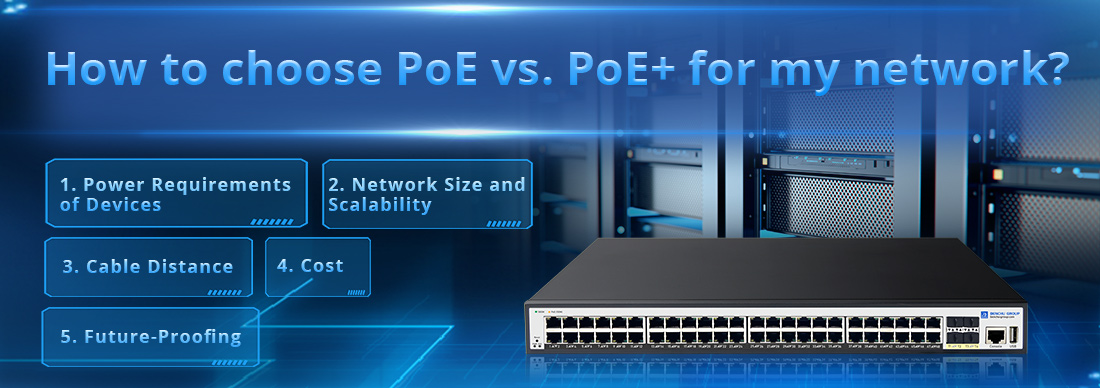
Choosing between PoE (Power over Ethernet) and PoE+ for your network depends on several factors related to your devices' power requirements and your network's overall design. Here's a breakdown to help you decide:
1. Power Requirements of Devices
PoE (IEEE 802.3af) provides up to 15.4W of power per port, with about 12.95W available after accounting for power loss over the cable. This is sufficient for low-power devices such as:
--- IP cameras (standard)
--- VoIP phones
--- Wireless access points (WAPs with basic features)
PoE+ (IEEE 802.3at) delivers up to 30W of power per port, with about 25.5W available to the device. PoE+ is necessary for higher-power devices like:
--- Pan-Tilt-Zoom (PTZ) cameras
--- Wireless access points with more advanced features (e.g., multi-radio)
--- Video phones or other devices with larger power demands
Recommendation: Check the power needs of your devices. If most of your devices need more than 15W, PoE+ is the better choice.
2. Network Size and Scalability
PoE may be sufficient for smaller networks with limited power-hungry devices.
PoE+ is better suited for larger, more complex setups or when you anticipate adding devices that require more power.
Recommendation: If you expect your network to grow or include more high-power devices in the future, opting for PoE+ from the start ensures scalability.
3. Cable Distance
Both PoE and PoE+ can deliver power over up to 100 meters (328 feet) of standard Cat5e or Cat6 Ethernet cable. However, PoE+ may be more sensitive to distance-related power losses, so higher-quality cables (e.g., Cat6 or Cat6a) are often recommended for longer runs or higher power consumption.
4. Cost
PoE switches and injectors are typically less expensive than PoE+ equivalents.
However, if you need to add power injectors or external power solutions for devices that need more power, upgrading to PoE+ switches from the start might save you time and money in the long run.
5. Future-Proofing
PoE+ is more versatile because it supports both PoE and PoE+ devices, allowing for flexibility in network design.
If you're setting up a network with long-term usage in mind, PoE+ may be the better investment, especially with the increasing power demands of modern devices.
Conclusion:
--- For low-power devices like basic IP cameras, VoIP phones, or small access points, PoE should be enough.
--- For power-hungry devices like PTZ cameras, advanced access points, or if you're planning for future expansion, PoE+ is the better choice.
Consider your network’s current and future needs before making a decision.